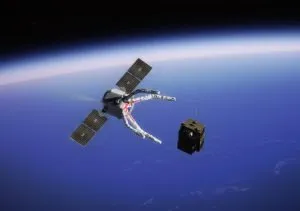The proposed Active Debris Removal (ADR) mission, will involve a specially designed spacecraft. It will be equipped with robotic and autonomous navigation technology. This will be to capture – and safely de-orbit – two non-functioning UK-licensed satellites from low Earth orbit.
The spacecraft will guide the defunct satellites into Earth’s atmosphere. Here, they will burn up, eliminating potential threats to LEO satellite networks.
Competitive bids
The latest mission will represent a shift in the UKSA’s approach, it highlights, from traditional grants to competitive contracts. This is designed, it says, to help stimulate private investment.
It has previously awarded grants to selected companies in this area – for example, Astroscale and ELSA-M, and ClearSpace and CLEAR – rather than engaged in a competitive process.
Protecting space
The agency describes the mission as a “critical step” in addressing the threat of space debris. The wider goal is ensuring the long-term sustainability of space operations. Basically, protecting the infrastructure that underpins modern life.
“This mission showcases the UK’s technical excellence and our commitment to protecting the space systems that modern life depends on,” said Dr Paul Bate, CEO of the UK Space Agency.
“It’s about securing the future of space for everyone, delivering tangible benefits here on Earth, and positioning the UK at the forefront of the in-orbit services market.”
Space debris
According to the UKSA, there are around 140 million pieces of space debris smaller than 1cm.
There are also over 54,000 tracked objects larger than 10cm currently orbiting Earth.
The threat, inevitably, is that even small fragments can cause catastrophic damage to satellites.
UK space sector
In terms of the wider UK space sector it is estimated as employing 52,000 people.
This is generating £18.9 billion in annual income from an ecosystem of 1,700 organisations, says the agency.
With labour productivity 2.5 times the national average, it notes, it helps underpin critical services that support 18% of UK GDP. For example, GPS, weather forecasting, and emergency communications, and national security.
The UK’s Minister for Space, Sir Chris Bryant, said the mission was a direct example of the government’s Plan for Change in action:
“By tackling the growing threat of space debris head-on, we are protecting the infrastructure that supports everything from national security to everyday connectivity whilst also creating high-skilled jobs and securing the UK’s leadership in the growing space economy.”
Image: ClearSpace – Artistic impression of the CLEAR Servicer approaching the client object
See also: UK Space Agency funds public services using satellite data

